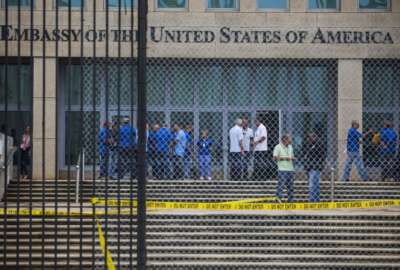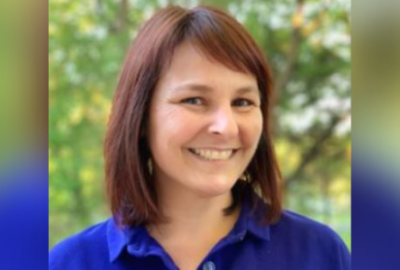
Yes, being a CIA agent is still a dangerous occupation
A look at what it's like to serve in the CIA from Marc Polymeropoulos, a retired, 26-year veteran of the agency.
Best listening experience is on Chrome, Firefox or Safari. Subscribe to Federal Drive’s daily audio interviews on Apple Podcasts or PodcastOne.
With all of the intelligence policy debates of the last few years, people sometimes forget the CIA has a kinetic, operational role in dangerous places throughout the world. For what it looks like, Federal Drive with Tom Temin turned to a retired, 26-year veteran of those foreign assignments, Marc Polymeropoulos.
Interview transcript:
Tom Temin: Mr. Polymeropoulos, good to have you on.
Marc Polymeropoulos: Thanks so much. It’s great to be here.
Tom Temin: Just briefly review your career. You were kind of in and out of headquarters, but you also carried guns and didn’t dangerous stuff far away.
Marc Polymeropoulos: First and foremost, I had a 26 year career that was not really remarkable in the sense a lot of people do this. There are many heroes behind the scenes at CIA. So I was one of many. But sure, I spent 26 years, a lot of time in war zones in Iraq and Afghanistan, other times overseas service, and then back at our headquarters as well in McLean, Virginia.
Tom Temin: And when one is overseas for an extended period, I guess it may be a year or two, would that be fair to say?
Marc Polymeropoulos: Yeah, sure. So our assignments can vary, whether it’s a temporary assignment or several years. So it all just depends. Sometimes you’re in war zones without your family, and then sometimes you are just posted abroad.
Tom Temin: Yeah, so it can almost feel like State Department as opposed to the DoD for example.
Marc Polymeropoulos: Sure. Yeah. Absolutely. One of misnomers about CIA is that we actually do carry guns and are dressed in 5.11 tactical gear. I always joke that as for an operations officer, one of the greatest talents is your ability to type, you have to be able to listen, and you have to be able to put down on paper what you’re reporting,
Tom Temin: And when you are in the field in whatever role, what is it that headquarters can best do in terms of support?
Marc Polymeropoulos: Oh, sure there’s a great synergy between the field and headquarters. When you are more of what we call the tip of the spear, if you’re spotting, assessing and recruiting and handling agents, foreigners who spy for the United States, that’s the raw intelligence that we would collect in the field and you send into headquarters, where we have this tremendous analytic component who kind of makes sense of it all. So they’ll look at our human intelligence, but they’ll also marry it up with other all source intelligence. And then they put together what is most required, which is papers or briefings for policymakers. And when the intelligence community is really humming, our true role is a support to policy.
Tom Temin: And having been there 26 years, that was probably four, perhaps five administrations that you served under, and they always have politics going back and forth with the intelligence community and the CIA. Did it seem at the level you operate it at that that was pretty much kept apart from the people doing the work day to day and year after year?
Marc Polymeropoulos: Absolutely. That’s the one thing so, obviously, we’re at the end of the Trump administration, the beginning of the Biden administration, but one of the things that I’ve consistently spoken about even in retirement, I retired in July 2019, and I’ve been very active in speaking to the public, everything I do gets cleared by the CIA’s publications review board. But when I do speak, one of the things I talk about is that we really are an apolitical organization. So I served for different administrations. But I’ll tell you, you’re so busy whether you’re at headquarters, or especially overseas, you really don’t have time to worry about politics. I think this most recent administration, with a president who was very active on Twitter, certainly made things more interesting. But really one of the the great hallmarks of the CIA and the intelligence community in general is that people just put their heads down and get the business of intelligence, and you really try to push any kind of politics aside.
Tom Temin: And from the standpoint of someone who did intelligence on a day to day basis, what’s your best advice for the incoming team in the IC and at the CIA?
Marc Polymeropoulos: First and foremost, I think nor new DNI, Avril Haines, who is a veteran of the national security apparatus, of course former deputy director, but also a lot of time at the NSC and state. This is a fantastic choice because she really knows how to integrate intelligence into policy. She knows our foreign partners very well. So I think that she will be a great success. And then for Bill Burns, the CIA director designate, what a fantastic choice. He was an ambassador in two major posts in the past in Moscow and Amman, so he knows about what intelligence collection really means. And of course, he served in policy roles back in Washington, so he knows how intelligence can help shape and formulate policy. So I think there’s an excellent team coming in, I think both will be very apolitical, and I think they’ll find a warm welcome from the intelligence community employees.
Tom Temin: And you were also a victim of the magnetic radio waves beaming that affected CIA and State Department employees in 2017 and 2018, causing brain damage. What did you experience and what’s your status so far?
Marc Polymeropoulos: So this is the hardest thing for me really to talk about. I was unfortunately kind of compelled to go public about this because I was not getting the medical care that I really needed and sought. I took a trip to Moscow in December of 2017, and there was an event there that certainly changed my life. I suffer now from migraine headaches that never go away. They’re 24/7 for the last three years. It’s particularly, for whatever reason, I’ve been going through a pretty bad spell now so my head’s killing me. On a good note is the agency has has relented after I did go public with my grievances and so I am going to the Walter Reed Traumatic Brain Injury Center for a month of outpatient treatment, which is really the place where I need to go. And so it’s been a really tough road for me, but the one thing that I’m most focused on not only in terms of my health, but also that this issue gets attention that those who have been affected in the past, and Senator Shaheen, who was very much involved in this issue, she has said publicly that it’s continuing to happen. So we just really need to make sure that our federal officials who really bravely serve overseas, that if these things do happen, that they get medical care, that’s first and foremost in my mind.
Tom Temin: did your injury occur in a hotel room or an embassy, what happened?
Marc Polymeropoulos: It was in a hotel room in Moscow. I was awakened to a terrible case of vertigo, tinnitus, nausea, headaches, and it started a three year medical journey where I’ve seen countless doctors, I’ve had multiple imaging, MRIs, etc. But the fact of the matter is, I’ve had a migraine headache for three years now that does not go away. And that’s taken quite a kind of not only physical, but also mental and emotional toll Going to Walter Reed is for me really important, because I need to figure out a way. I’m not as concerned on the who did this part, that’s something for the intelligence community to find out, I’m concerned on treatment for myself and for others.
Tom Temin: But at the first occurrence, you sense that directional quality of the radiation that other people have reported?
Marc Polymeropoulos: Who knows, I think my symptoms were a little different than those that I’ve heard about who experienced it in Havana. But one of the key points on that is there was a big study that came out from the National Academy of Sciences which talked about their conclusion it was likely radiation microwave weapon that caused this. But one of the important other pieces in that was that every individual, everyone’s individual body composition is different, so everyone’s going to react to it differently. So the fact that I don’t look exactly like some of the Havana victims is not necessarily because I was not affected. I think that study gave us, a lot of us who’ve been hit by this, a lot of hope in that, look a lot of people think we’re crazy when we’re talking about this stuff, this sounds like that of a science fiction movie, but the bottom line is, a lot of people are sick, so they really need treatment. And so the NAS study, I think, was really important in that it gave us a lot more legitimacy as we move forward.
Tom Temin: And we interviewed Dr. David Relman of the Palo Alto Veterans Affairs health system on that very topic just a couple of weeks ago, and we’ll have a link to that interview as well. And you have a book on leadership, it’s more a book on leadership than telling what you did and experienced in the CIA?
Marc Polymeropoulos: Yes, I do. So I wrote a book, and one of my passions at the end of my career was mentoring. I made a lot of mistakes in my career, but I thought I was a very good leader. So I wanted to kind of put that forward to the general public. And so it’s not a book about any kind of heroism. In fact, most of my leadership principles, talk about how to deal with adversity and how to overcome failing, and really learning how to lead in times of ambiguity and crisis. So it’s coming out, Harper Collins is publishing it in June. It’s called Clarity in Crisis. And I’m really excited about this, because again, I think it’s going to be applicable to all walks of life. We see a lot of former US military, US military special operations personnel writing books on leadership, but there’s not that many from the intelligence community. So I hope people will be interested in this and I can pass on some of my wisdom that I learned over working in really dark places in the third world. And again, it’s not a book about myself not book about any kind of heroism, it’s much more about leading under fire and learning from mistakes and learning from adversity. And I talk about the one principle that I believe in the most is humility.
Tom Temin: And my final question is for those that might be considering a career in the intelligence community, and the federal government has recruiting, not so much recruiting problems, but talent skill acquisition challenges from time to time. What’s the selling proposition for a career in the intelligence community, or at the CIA in particular?
Marc Polymeropoulos: This is a fantastic question. And let’s put aside my health issues at the end of my career. Look I risked my life and a lot of places, whether it’s Iraq and Afghanistan, so things finally caught up to me. So just leave that aside. But I’ll tell you that I talk to college students all the time, I talk to a lot of young Americans who I stress that joining the intelligence community was the greatest honor of my life. I think it’s a fantastic career. Not only did I see the world, but experience different cultures, you get to serve your country. And I’ll tell you, I love this story, I was serving in the third world in a country in which we had a very adverse relationship. And I remember walking down the street and just seeing the silhouette of the American flag lit up at the US Embassy. And boy, that was motivating to me. So I love talking to young folks, I would encourage, look you’re not going to Google or Apple, you’re not going to make millions, but you get to serve your country. And to me, that still certainly resonates it was the greatest honor of my life doing so and so I would encourage it, and I still will talk about this until my last breath that there’s nothing like federal service and particularly the intelligence community was just a tremendous place to make a career.
Tom Temin: Marc Polymeropoulos is a 26 year veteran of the CIA and author of a book just out. Thanks so much for joining me.
Marc Polymeropoulos: Thanks so much. Have a great day.
Copyright © 2025 Federal News Network. All rights reserved. This website is not intended for users located within the European Economic Area.
Tom Temin is host of the Federal Drive and has been providing insight on federal technology and management issues for more than 30 years.
Follow @tteminWFED
Related Stories





